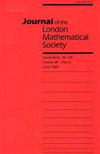环上的完全非中心李理想和不变加性子群
IF 1
2区 数学
Q1 MATHEMATICS
Journal of the London Mathematical Society-Second Series
Pub Date : 2025-03-18
DOI:10.1112/jlms.70127
引用次数: 0
摘要
证明了环上李理想或不变加性子群包含所有加性对易子的条件。一个关键的假设是子群是完全非中心的,即它在每一个商中的象是非中心的。对于特征域≠2$ \ ne2 $上的一元代数,其中每个加性对易子都是平方零元素的和,我们证明了一个完全非中心子空间是李理想的当且仅当它在所有内自同构下都是不变的。这尤其适用于零积平衡代数。本文章由计算机程序翻译,如有差异,请以英文原文为准。

Fully noncentral Lie ideals and invariant additive subgroups in rings
We prove conditions ensuring that a Lie ideal or an invariant additive subgroup in a ring contains all additive commutators. A crucial assumption is that the subgroup is fully noncentral, that is, its image in every quotient is noncentral. For a unital algebra over a field of characteristic where every additive commutator is a sum of square-zero elements, we show that a fully noncentral subspace is a Lie ideal if and only if it is invariant under all inner automorphisms. This applies in particular to zero-product balanced algebras.
求助全文
通过发布文献求助,成功后即可免费获取论文全文。
去求助
来源期刊
CiteScore
1.90
自引率
0.00%
发文量
186
审稿时长
6-12 weeks
期刊介绍:
The Journal of the London Mathematical Society has been publishing leading research in a broad range of mathematical subject areas since 1926. The Journal welcomes papers on subjects of general interest that represent a significant advance in mathematical knowledge, as well as submissions that are deemed to stimulate new interest and research activity.

 求助内容:
求助内容: 应助结果提醒方式:
应助结果提醒方式:


